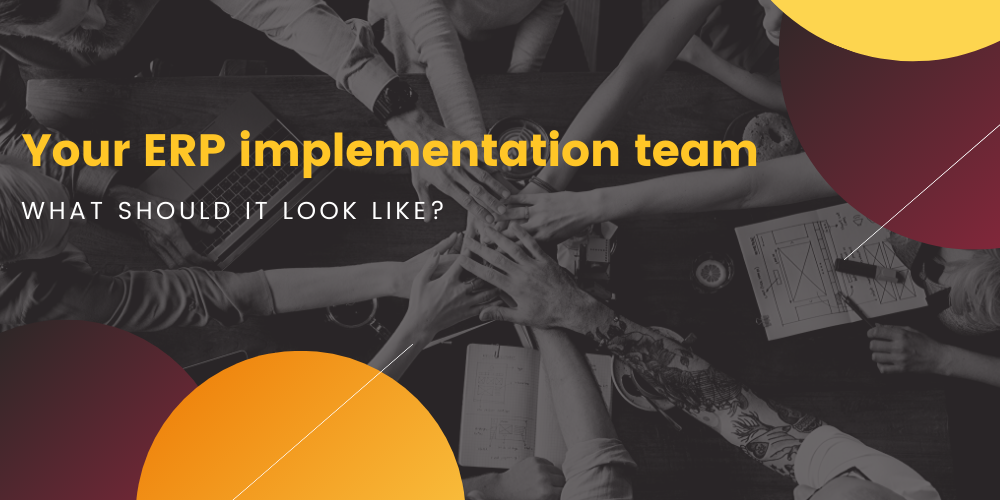What should your ERP implementation team look like?

There are many reasons you may be considering undertaking an ERP implementation.
It could be to increase productivity, streamline your internal operation, or improve your customer’s experience. Whatever your end goal is, to ensure the project is a complete success, it is crucial to choose the correct software and the right ERP implementation team.
Research has shown NetSuite is the leading company for cloud-based ERP on the market. In our recent report, 68% of end-user respondents adopted the NetSuite software due to its user-friendly functionality and clearer reporting capability — helping them to make their work process more efficient.
According to our report, the average time taken to implement a NetSuite software is between 4-6 months — almost a third of the time of the industry standard. However, participants claimed delays can occur due to poor planning and unforeseen customizations. To ensure this doesn’t happen to you, it’s vital for your business to employ the right team to set it up and run your implementation project.
Download our recent report and gain further insight into a NetSuite ERP implementation.
So who exactly do you need in your implementation dream team? Let’s run you through the key players:
The ultimate NetSuite implementation team
The Executive Sponsor
This is someone who will take on a high level of responsibility — usually a senior member of the business advocating for a new ERP system. They will lead the implementation team from the front and liaise with primary stakeholders throughout the entire project.
The direction in which the implementation goes is ultimately up to the project owner, even if they aren’t directly involved in the actual implementation. You need a calm thinker, as they’ll be relied on to solve unforeseen issues that arise. Ideally, this position will be held by your CIO, CTO, or CDO; but, if your company doesn’t have a full C-Suite, then ensure your CEO or CFO is present throughout the project.
Avoid a communication breakdown during your ERP project.The Project Manager
The project manager should have a technical understanding of your business process and is responsible for organizing the implementation process — ensuring it’s on time and budget. They will work with the project owner to guarantee the development of the ERP system is meeting the business’s goals for the solution.
They will coordinate with the internal implementation team and update the plan as and when required. Other responsibilities may include:
- Being the point of contact for resolving issues from employees
- Reporting project progress
- Directing and motivating the project team
- Managing schedules
- Managing the budget and timing of the project
Your Project Manager will be assisting the Project Owner with issues, so you need a problem solver here.
The superstar end-user
The super end-users can be described as the most versatile players in this squad, and arguably the most critical team members to the long-term success of your solution. In our recent report, we learned 52% of end users were involved in a NetSuite ERP implementation.
The end-users are a team of internal employees brought in to represent the different departments in the business. They will champion the use of the ERP system throughout the business and help drive user adoption post-implementation.
Throughout the project, your end-users will maintain an open dialogue between the project management team and the rest of the business. When choosing your team of super end-users, look for someone with great communication skills. They should be able to address any non-technical issues, requests, or concerns that the employees may have and escalate them correctly to the project manager.
The end-users must be fully engaged with the project, have an adept technical skillset, and demonstrate strong leadership attributes.
Learn how to measure the success of a NetSuite product.The functional team members
The functional team is made up of technical experts from your company’s finance, manufacturing, and IT departments, and they’re responsible for communicating the more complex aspects of the software to the non-technical end-users.
Building a cross-functional team is a great opportunity for the different department to bring their expertise together to strengthen the ERP system for the business.
Additional responsibilities include:
- Acting as a mentor to others in their functional area
- Working with users to develop processes that will accommodate the new software application
- Contributing to status reporting
- Helping to design and configure software parameters for each module
- Identifying process improvement opportunities within the new ERP solution
In some cases, functional team members are referred to as Subject Matter Experts (SMEs).
Bring in a Functional expert!
A functional NetSuite consultant can really add value to your ERP implementation team. Strengthen your team with a NetSuite specialist —Visit our candidate search today!
The Report Writer
Your report writer is a valuable asset who is needed to modify existing reports. Most companies prefer to train someone in-house, though it is possible to outsource the role of a specialist.
The key responsibilities in the role of a Report Writer include:
- Analyzing the effectiveness of any existing report procedures and systems
- Developing process enhancing strategies
- Writing and maintaining all reporting processes
- Understanding the company’s implementation methodology and being able to use it on all engagements
- Complete any work assigned by the Project Manager and within the allocated time
If it’s a smaller company that is implementing the solution, this role is occasionally tasked to the super-user.
The Implementation Partner
Choosing your implementation partner is not a decision that should be taken lightly. A good partner will know the best approach to the project and will offer you realistic timescales to follow. This isn’t always possible if you keep the project in-house as your staff are likely to not have as much experience in the process.
The most important consideration, according to Jonathan Stuart of Oracle Gold partner Claremont, is to be very clear on what your business is trying to achieve by implementing an ERP.
You’ll find partners will inform you of any obstacles or hidden costs in the early stages of the project to ensure problems won’t appear mid-implementation.
Having a team and plan in place is crucial to any ERP implementation. “Trust what they recommend,” says Stuart. “Many projects have been delivered late where customers have attempted to deliver ERP to a more aggressive timescale, or with more functionality than recommended by the implementation partner.”
It’s often thought that you should take as much time choosing your partner as you do your vendor. When whittling down your options, you should focus on five points:
- Their proven expertise
- Their inquisitive nature
- Their plan for the project
- How responsive they are
- How transparent they are
Jeremie Pettigrew, Senior Consultant at Big Bang ERP says:
In our recent report, 76% of partner participants said their NetSuite workload has increased in the last year — with a further 79% of respondents expecting it to increase in the next 12 months.
For more information on outsourcing your NetSuite implementation, download our report independent market report on the NetSuite industry.
Should you outsource your NetSuite implementation?
Of course, you do have the option of outsourcing your implementation project. It’s not a secret that implementing a new ERP solution requires a great deal of skill, teamwork, and dedication and often companies can’t do it all themselves.
To make sure you efficiently outsource the correct roles, it’s worth conducting a gap analysis of the skills needed for successful implementation and comparing it to the caliber of internal skills your company currently possesses in-house. Those that appear to have the biggest gaps are the positions that you should think about outsourcing to ERP consultants.
There are many other reasons why you should consider outsourcing your project, such as:
- Implementers have a systemic way of installing the systems and their knowledge has been built up over many installations
- It allows your internal team to focus on other tasks by reducing its implementation workload
- For larger companies, more in-depth ERP packages are necessary, which would mean more hands are needed on the project
By reducing the burden on your own team members, outsourcing can save time and money while being more efficient as the vendors will upgrade their cloud services as and when applicable.
Build your ERP dream team!
Our database is filled with pre-screened and highly qualified NetSuite candidates. Whether you’re looking for a developer, admin, or project manager — we’ve got you covered! Visit our candidate search today, and start building your ERP dream team.





